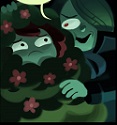|
Screaming Idiot posted:Is it okay for biases to show up in writing? I started my story about an seven-foot-tall amnesiac waking up in a tomb with a magical katana grasped in his hand and I somehow ended up with him in court for assaulting his world's equivalent to a cop for trying to arrest a pair of beggar children. It's only the third chapter. Uh... that’s pretty much the whole point of writing. Knock yourself out.
|
|
|
|

|
| # ? May 22, 2024 08:22 |
|
bigperm posted:I have a problem with being too nice to my characters. All of my stories just sort of fade into this really boring situation where only good things are happening. I just really struggle putting a character through any sort of lasting trauma. Does anyone have any advice on getting over this? That's pretty much death for a story. You want a reader to keep turning the page. When things are too easy for the hero, it robs the story of tension and that makes the story boring, and a bored reader puts the book down. Some authors somehow can get away with having a boring invincible hero in boring, tedious stories (David Weber), but that's probably because those are later works in a series and the have already established themselves as successful. Almost every scene in a book should have a setback at the end. You are going to need to make your hero struggle. This does not mean that everything has to be grim and miserable (G. R. R. Martin), though. Suffering does not mean you need to give your hero crippling and disfiguring injuries - especially if that would prevent them from continuing.
|
|
|
|
I feel like I'm going the opposite direction, and wonder how many times I can injure a character before it starts coming across as misery porn or that I'm some weirdo who enjoys pain. How many times can I injure my character before it starts to seem routine? In the case of severe injuries, how many times can I have the protagonist spend time recovering before it starts to drag the story down?
|
|
|
|
There are other ways to have setbacks than physically maiming them. Move the immediate goal slightly out of reach, delay them, put them on a detour, etc. Personally I find it exhausting to read things where the protagonist gets the poo poo kicked out of them constantly. Change it up a bit. Let them attain parts of goals but then give them a new the goal post. Some of the most satisfying conflicts are those that someone gets what they want but then they find that the situation is much bigger than they first thought and that it triggers a new need or it turns out that what they thought they wanted wasn’t really enough.
|
|
|
|
bigperm posted:I have a problem with being too nice to my characters. All of my stories just sort of fade into this really boring situation where only good things are happening. I just really struggle putting a character through any sort of lasting trauma. Does anyone have any advice on getting over this? Read more fiction where the struggle is internal, maybe going to either memoirs or internal character conflict stories. Good things can happen, but how your protagonist reacts can be the conflict.
|
|
|
|
Leal posted:I feel like I'm going the opposite direction, and wonder how many times I can injure a character before it starts coming across as misery porn or that I'm some weirdo who enjoys pain. Didn't you LP a Neptunia game? Are you trying to say that you're NOT some weirdo who enjoys pain?  Really, though, it depends on whether you enjoy reading misery porn. I think if you want to avoid being too grimdark, you need some elements of hope and comic relief. A lot of bad things happen to the protagonist in Sebastian DeCastell's "Spellslinger" series - not crippling injuries usually, but bad things, but the tone isn't hopelessly bleak. quote:How many times can I injure my character before it starts to seem routine? That depends on the severity of the injuries. split lips, cuts scrapes, bruises, that can go about once per fight. A good sprain or concussion can linger for the rest of the book and you can get a new one next book. You probably don't want a protagonist to lose a tooth per fight though, and a broken limb is best saved for the climax so you don't have to deal with it all novel. quote:In the case of severe injuries, how many times can I have the protagonist spend time recovering before it starts to drag the story down? Once per protagonist book. More than that and it gets repetitive. (And even then only 3 protagonists max.) Stabbey_the_Clown fucked around with this message at 22:55 on Oct 4, 2019 |
|
|
|
bigperm posted:I have a problem with being too nice to my characters. All of my stories just sort of fade into this really boring situation where only good things are happening. I just really struggle putting a character through any sort of lasting trauma. Does anyone have any advice on getting over this? What if the characters realize what's happening. Only good and positive things are flooding their lives despite their own work, intent, perceived self value. No matter what they do, they're embedded in a world where trauma, conflict, unhappiness has been snuffed out. Your character steps in front of a bus only for the vehicle to putter on empty, harmlessly stopping without collision.
|
|
|
|
Stabbey_the_Clown posted:Didn't you LP a Neptunia game? Are you trying to say that you're NOT some weirdo who enjoys pain? D-drat...
|
|
|
|
I once took a creative writing class in college. One of our fellow students was a kindly middle-aged lady writing a romance novel. She had the "too nice to her characters" problem: The main character and her boyfriend were getting along perfectly fine, a love rival was introduced but quickly became friends with the boyfriend and was like "I could never get in the way of their true love," etc. We hammered on about how the story was kind of static. "Everyone is too nice! There's no conflict! Torture your characters!" we told her. So about three-quarters of the way through this placid peaceful story, she introduced an international drug smuggling ring who kidnapped the boyfriend, castrated him, and ultimately drove him mad enough to pilot a speedboat full of dynamite into the smugglers' boat, blowing it sky high and sacrificing himself. After years of mourning, the protagonist finally married the secondary love interest. We all read this and went, um. Good job, I guess.
|
|
|
|
It really is amazing how much a fresh perspective on something can help you fix what you have and make it so much better. you get so used to staring at the same words and structure, you just don't think about something that might seem obvious to some one else- move that event around and rearrange the order of these things! In seemingly unrelated news, Nae is the best person and Charred is in a mild third draft now! More of a 2.5 draft but it's somewhere closer to where I feel confident to submit it to an agent. If only I knew how to describe my own poo poo and promote it.
|
|
|
|
Mirage posted:
Its always so frustrating when authors resort to cliches.
|
|
|
|
Mirage posted:I once took a creative writing class in college. One of our fellow students was a kindly middle-aged lady writing a romance novel. She had the "too nice to her characters" problem: The main character and her boyfriend were getting along perfectly fine, a love rival was introduced but quickly became friends with the boyfriend and was like "I could never get in the way of their true love," etc. holy poo poo  amazing amazing
|
|
|
|
Mirage posted:I once took a creative writing class in college. One of our fellow students was a kindly middle-aged lady writing a romance novel. She had the "too nice to her characters" problem: The main character and her boyfriend were getting along perfectly fine, a love rival was introduced but quickly became friends with the boyfriend and was like "I could never get in the way of their true love," etc. Please write a novel about this.
|
|
|
Mirage posted:I once took a creative writing class in college. One of our fellow students was a kindly middle-aged lady writing a romance novel. She had the "too nice to her characters" problem: The main character and her boyfriend were getting along perfectly fine, a love rival was introduced but quickly became friends with the boyfriend and was like "I could never get in the way of their true love," etc. This sounds actually great though
|
|
|
|
|
Stabbey_the_Clown posted:Almost every scene in a book should have a setback at the end. I think I generally disagree with this. It's one way of writing, but I find works very onenote when every (or even most) scenes end with a setback (particularly if that setback is used to set up some kind of cliffhanger). I took a scriptwriting class a few years ago; you'd write a short (5-10 page) script based on a prompt for every meeting, you'd pick some volunteers to read it, and then you'd get a critique.* I signed up because I thought it would be a great way to hone dialogue and information control (and it was), but between writing ~20 isolated scenes back-to-back with more-or-less immediate feedback and spending focused time critiquing a bunch of attempts from others, I arrived at some conclusions about what makes a scene engaging, at least for me.† A longer form work has additional constraints but it also has the benefit of leaning on what has come before to keep readers engaged. When I'm trying to decide if a scene is right, I look for two things:
That said, this bigperm posted:I have a problem with being too nice to my characters. All of my stories just sort of fade into this really boring situation where only good things are happening. * Which you were not allowed to engage with or respond to until everyone was done, thank god. † I promise this isn't a very elaborate way of saying "write more." Wallet fucked around with this message at 17:56 on Oct 5, 2019 |
|
|
|
Wallet posted:When I'm trying to decide if a scene is right, I look for two things: Well obviously the scene has to accomplish something. No friggin' kidding. I posted the link because I didn't see the need to re-post in full something I posted just two weeks ago word-for-word. If you had followed the link (which I am not sure you did), I elaborated that there were two main types of scenes: proactive (Goal, Conflict, Setback (or Victory), and reactive (Reaction, Dilemma, Decision). "A turn, a significant success or setback" sounds like a proactive scene, and "a moment of catharsis or repression" sounds like a reactive scene. Yes of course you don't need to end every single scene on a setback. You can end scenes on victories - particularly when the stakes of the conflict are such that failure would end the story. The point of trying to end scenes with setbacks is to keep the reader enticed. You want them to think "oh no, what's going to happen now?" Setbacks don't mean "still the exact same problem". If so, that would mean it's still the same scene. A "setback" usually means that either the nature of the problem has changed somehow, or that the previous problem has been solved, but there's a different problem now. quote:"Nancy and Susan are a very happy couple and everything is great" isn't really a story on its own; it doesn't have to have a driving conflict to be a story, but it does need to have something to say. Disagree. Stories do need to have a driving conflict. The conflict doesn't have to be external, it could be internal, it could have both, and the scale of conflicts can vary... but there should be some kind of conflict in a story. Stabbey_the_Clown fucked around with this message at 20:34 on Oct 5, 2019 |
|
|
|
there are ways to write stories without conflict. it's generally easier to come up with a story by finding a conflict than with other forms of narrative arcs, but it's not necessary for a story
|
|
|
|
Stabbey_the_Clown posted:Well obviously the scene has to accomplish something. No friggin' kidding. Stabbey_the_Clown posted:I posted the link because I didn't see the need to re-post in full something I posted just two weeks ago word-for-word. If you had followed the link (which I am not sure you did), I elaborated that there were two main types of scenes: proactive (Goal, Conflict, Setback (or Victory), and reactive (Reaction, Dilemma, Decision). "A turn, a significant success or setback" sounds like a proactive scene, and "a moment of catharsis or repression" sounds like a reactive scene. I did; it's a perfectly valid approach to writing, but it's pretty reductive to suggest that all valid/good/whatever stories are described by it. A scene can do many things that don't really fit into either of those molds, and without ending on a setback/victory/decision. "oh no, what's going to happen now?" isn't the only way to reel in an audience. quote:Disagree. Stories do need to have a driving conflict. The conflict doesn't have to be external, it could be internal, it could have both, and the scale of conflicts can vary... but there should be some kind of conflict in a story. A driving conflict isn't really the same as a story having some kind of conflict somewhere within it, but as Djeser points out stories are written that don't even have that. Some of them are good! Wallet fucked around with this message at 21:38 on Oct 5, 2019 |
|
|
|
Man, a big downside of serialized fiction seems to be that you have to come up with a title for the whole work when you publish the first chapter, but I don't like coming up with titles until I'm finished.
|
|
|
|
The problem I'm having with my story is sort of related to conflict, that is, the lack of it. I introduce a want of my main character right away (a boy who's running away riding the rails East to find work adventure), but he basically insists on helping a girl in trouble (who's lost and trying to find her way home) because he sees she's lost (and she's more hesitant, contrasted with the naive boy she's more untrusting of strangers). I've been pantsing through writing the 8,000 words and I'm stuck, and I'm starting to admit to myself that this is my main problem, I don't really have an arc, and I need to start over from scratch with some of the main ideas I had as a guide. I have a series of things that happen in the story. Granted, they all are logical "but/therefore" events, but there's no arc to it for either of my main characters. I had the vague idea that the villain's daughter has a bit of an arc from being selfish to sacrificing herself. (The plot is the villain turned his daughter into a bird by accident, and cursed the MC girl to be a bird during the day, to cyphon off the bird-ness to her, but she got away before he could complete the process). I don't know if I really like it, or the idea of the sacrificial bittersweet ending in this story anyway.
|
|
|
|
Foolster41 posted:The problem I'm having with my story is sort of related to conflict, that is, the lack of it. So your lead character, let's call him "Joe" is walking through a train station and sees this girl, "Karen". Something tells Joe that Karen is in trouble. Maybe it's her body language, or the lost look in her eyes, but Karen needs something. Karen needing something and Joe deciding to help her are fine. What you need to answer is "What does Joe want", and "just wander east in search of adventure and work" is too vague. Joe has his own problems to deal with. You should decide what those are. Joe might want to help Karen, but it's going to be a balancing act. Helping Karen should either seem to be a way to help Joe achieve his goals, or something that he chooses to do in spite of it interfering with his goals. Let's go back to Joe's motivations. If Joe is looking for adventure, he is probably financially equipped to support himself while seeking adventure (or, in a videogame world, he can go grind for loot). What does "looking for adventure" mean? Does Joe want to be famous? Does Joe want to be rich? What does Joe seek from "adventure"? If Joe is looking for work, that suggests that Joe's finances are tight. (Worldbuilding: If he's crossing the continent in search of work, that suggests that either the economy of the world is bad locally, or else Joe has a specific skill set which is not in demand locally, but is in demand elsewhere.) quote:I've been pantsing through writing the 8,000 words and I'm stuck, and I'm starting to admit to myself that this is my main problem, I don't really have an arc, and I need to start over from scratch with some of the main ideas I had as a guide. Having arcs for characters is a good idea. Try and tie them into the story. This sort of thing. I think I made a post about that a while ago. I don't know if it will help, but worth a shot. If you only know where your plot arc is leading, use that to think about what your character arc should be (or vice versa). quote:I had the vague idea that the villain's daughter has a bit of an arc from being selfish to sacrificing herself. (The plot is the villain turned his daughter into a bird by accident, and cursed the MC girl to be a bird during the day, to cyphon off the bird-ness to her, but she got away before he could complete the process). I don't know if I really like it, or the idea of the sacrificial bittersweet ending in this story anyway. Telling us this doesn't help us help you, because we don't know anything at all about the villain's daughter at all. It's fine to have an idea about the ending or various scenes and to write those down. Write the story in order and see if by the time you get to your scenes if they still make sense to do. Stabbey_the_Clown fucked around with this message at 18:59 on Oct 10, 2019 |
|
|
|
Some good food for thought, thanks. quote:What you need to answer is "What does Joe want", and "just wander east in search of adventure and work" is too vague. Yeah, I forgot to mention he wants to apprentice with a magician in chicago. Maybe I need to add a time limit (the magician's going to Europe for a while), and so Sam's conflict is feeling bad for and helping Mary, but also really wants to get to Chicago in time. That would add more conflict, and something he could potentially give up as an arc. quote:(Worldbuilding: If he's crossing the continent in search of work, that suggests that either the economy of the world is bad locally, or else Joe has a specific skill set which is not in demand locally, but is in demand elsewhere.) I forgot to mention, this is set in the 1930s. His family's pretty poor, so he's doing what a lot of kids did in that time period. quote:Telling us this doesn't help us help you, because we don't know anything at all about the villain's daughter at all. Basically, the villain's daughter is really privileged and spoiled. She has no idea about the whole bird thing. Then she finds out and is ready to just allow Mary to be sacrificed so she can be "normal" (human 100% of the time), but is convinced by Sam and Mary that it's wrong (somehow, I wasn't quite sure). Like I said, I'm not really big on the main arc not being one of the main characters. again, thanks!
|
|
|
|
Sounds to me like the common problem of having a bunch of ideas that would make cool parts of a story, but without an actual story to tell. When that happens to me, I back up and ask myself what I want this story to be about. Sometimes that means losing some of the ideas I thought would be cool, because they just won't fit. That's fine, there's always going to be more stories to write. I'm not big on planning things out either, but there's a big difference in quality between what I write when I know where I want to go with something and what I write when I'm just spinning my wheels. The spinning-my-wheels stuff can sometimes be helpful for figuring out what the useless bits are, but they almost always wind up dumped as unfinished rough drafts.
|
|
|
|
Help, I've started a somewhat humorous adventure novel, and now it's slowly growing into a slightly humorous novel of lower class exploitation, and slavery with extra steps in a corporate-run police state. Mind, there are still explosions.
|
|
|
|
SelenicMartian posted:Help, I've started a somewhat humorous adventure novel, and now it's slowly growing into a slightly humorous novel of lower class exploitation, and slavery with extra steps in a corporate-run police state. Mind, there are still explosions. Sounds like the novel: "Pimp my Airship."
|
|
|
|
SelenicMartian posted:Help, I've started a somewhat humorous adventure novel, and now it's slowly growing into a slightly humorous novel of lower class exploitation, and slavery with extra steps in a corporate-run police state. Mind, there are still explosions. No help needed, that sounds like the best possible direction. Consider going darker with your humor to match the shift in tone.
|
|
|
|
help im writing
|
|
|
|
Sitting Here posted:help im writing No one can help you now You are doomed
|
|
|
|
Sitting Here posted:help im writing if only posting counted as writing
|
|
|
|
I know the entire point of fictional stories is that they're stories, and thus the only obligation you have towards realism is not breaking the reader's suspension of disbelief, but I'm struggling a bit to start a story whose core premise is fundamentally unrealistic. Most of the story is a slow, deliberate spy drama that follows a team of cool guys running around the world investigating stuff. I'm going out of my way to depict it semi-realistically, so they spend a lot more time on accounting, surveillance, bribery and diplomacy than they do on running gunfights and dramatic helicopter chases through burning buildings in a secret submarine base. The problem is that the core framing device is a fish out of water story: the protagonist is an analyst, and not a very good one. She's dedicated and competent, but she also kind of sucks: she works in a dead-end department endlessly doing boring nonsense and wasting half of her day filling out forms and requisitions, and by the time the story begins all of the glamor of civil service has been worn away, and she's pretty amiably resigned to a career of tedious analysis and TPS reports. However, circumstances conspire to place her at the center (or at least at the periphery) of events, and her bosses kick her over to a covert operations unit that is much closer to what you'd expect from spy fiction: hard-bitten jerkasses with years of experience in the nastier end of the espionage game. Analysts and field ops are such fundamentally different skillsets that I'm struggling to contrive why she would possibly be invited or required to join their team- it's like grabbing someone with a PhD in Microbiology and going "You look like a Science Guy, get into that surgical theatre and help them operate on that dude." I considered making it an internal affairs/spy-hunting kind of deal, where her agency has a double-secret plan that relies on her either baiting someone into making a mistake or spying on her own people and finding the mole/bad guy/whatever, but that's really cliche and it either requires her to be a really nasty and cutthroat person (which she isn't; picture a liberal arts PhD candidate early in their program, before they get ground into a bitter and empty shell; that's her), or for the agency to be playing her all along, which I don't like because it's incredibly unsatisfying to reveal that the protagonist's goals were irrelevant to the overarching plot. I could try for a (movie) Jack Ryan deal, where she has some kind of specific expertise that the boots on the ground need, but the entire structure of an intelligence program is built around not requiring the expensive, hard-to-train subject experts to run around dodging bullets. Plus, I'd like the story to take place over months or years and touch on her reluctantly picking up and sucking at the sort of tradecraft that every field operative needs to master, and that wouldn't make sense if they need her for a specific, urgent purpose. So what's left? The only other idea I can kinda-sorta see working is if the team loses a guy and intentionally recruits her to take his place because their leader is great at finding talent in unconventional places, but I think the fish out of water thing works much better if neither she nor the team want her there, so they can butt heads even as events conspire to force their cooperation.
|
|
|
|
Could they want her because she isn't one with field ops training? Like, I don't know, a key ops instructor turned out to be a traitor and all his students are suspect, so they want take in an outside idiot and she just happens to bring them a boring file that day.
|
|
|
|
analyst gets sent to ops team simply to brief them with accurate, specific information, that's it. that's all it was supposed to be. nothing more. short and simple. not even uniquely qualified to give the briefing, they just happened to send her. but someone tries to get the jump on them in the middle of it, and between some highly suspect circumstances and whatever the briefing was about seeming pertinent, the ops team is now dragging the analyst along. analyst gets sent to ops team because of a loving typo. the error is actually caught but bureaucratic momentum has already sent the information multiple fiscal years deep into a paperwork hole, so that nobody can actually do anything about it until forms are requested and cleared and pulled and unsealed and corrected and reviewed and processed and sent before committee and signed and reprocessed and so on. so now the analyst is with the ops team but it's okay there's nothing on their plate at the moment they'll just wait this out until the error is corrected and she's sent back to the office, but events unfold such that they see fit to drag her along into the field. ...meanwhile, the top agent who was intended to be with the ops team has no idea why they've been assigned to the office but is kinda enjoying just hanging around the place and stealing from the vending machine. analyst gets sent to ops team for the whole quick briefing situation from the first one again. some stupid political spasm occurs back at home and suddenly the analyst and the ops team have been left behind in a rapidly destabilizing region, very few people even know they're there, no one's coming to get them, and it's going to be at least another year before poo poo even has a chance of getting fixed so they're on their own.
|
|
|
|
I forgot about a reply I typed up and had to abandon.Foolster41 posted:Yeah, I forgot to mention he wants to apprentice with a magician in chicago. Maybe I need to add a time limit (the magician's going to Europe for a while), and so Sam's conflict is feeling bad for and helping Mary, but also really wants to get to Chicago in time. That would add more conflict, and something he could potentially give up as an arc. Stage magician or Harry Potter magician? (I'll assume stage.) Okay, so my random guesses for how the story arc goes... I guess this magician passes through Sam's hometown and Sam shows some natural talent, Magician is willing to take him on, but for whatever reason, Sam can't go immediately. Magician says "if you get the chance, look me up in Chicago, I'll be there for a couple months before going on tour". Something happens at home to make Sam decide to go off in search of that job. Okay, got it. quote:I forgot to mention, this is set in the 1930s. His family's pretty poor, so he's doing what a lot of kids did in that time period. So bad economy, okay. Just checking. quote:Basically, the villain's daughter is really privileged and spoiled. She has no idea about the whole bird thing. Then she finds out and is ready to just allow Mary to be sacrificed so she can be "normal" (human 100% of the time), but is convinced by Sam and Mary that it's wrong (somehow, I wasn't quite sure). Like I said, I'm not really big on the main arc not being one of the main characters. Step 1: Selfish spoiled girl is selfish and spoiled. Step 2: ??? Step 3: Selfish spoiled girl decides to sacrifice her life for a stranger. If you really want to keep Step 3, you'll need to give the selfish girl a prominent part in the story so the reader can see her change. Actually, you'd probably need to do that anyway even for non-selfish spoiled characters, because sacrificing one's life will only be meaningful to the reader if we see a character enough to care about them (or a different character which we DO care for is affected by the sacrifice). Omi no Kami posted:I know the entire point of fictional stories is that they're stories, and thus the only obligation you have towards realism is not breaking the reader's suspension of disbelief, but I'm struggling a bit to start a story whose core premise is fundamentally unrealistic. One trick could be to treat everything casually, no matter how crazy and outrageous. I recently read Daniel O'Malley's urban fantasy book called The Rook, which is about the U.K.'s supernatural secret agency. No matter how bonkers and crazy the superpower and situation, it's treated like this is par for the course. EDIT: Is it possible to hand-wave it and ignore the implausibility? If you present it well enough, the reader won't go "this is dumb", they'll go along with the premise. In those cases, try not repeatedly calling attention to how implausible it is since there won't be any "aha so that's what that meant" payoff later. quote:but the entire structure of an intelligence program is built around not requiring the expensive, hard-to-train subject experts to run around dodging bullets. This seems like the best approach. The problem is that intelligence work is always imperfect, and situations can change rapidly. Suddenly new intel comes in and her expertise is needed for X reason, and it's either not possible to train the wetwork operatives, or they don't do well in the training. So the enalyst is put through a critical crash course in field training. It's okay if she largely sucks at the field training, since time is limited and they don't expect her to have to use it. Maybe have her act as a mission control sitting in the van or whatever, expecting to only have to advise someone in the field over the radio, then something goes wrong and suddenly she's needing to put on that outfit she and go out in to the field and there's so much pressure and she was never trained for this oh god oh god i'm on the edge of panic. quote:Plus, I'd like the story to take place over months or years and touch on her reluctantly picking up and sucking at the sort of tradecraft that every field operative needs to master, and that wouldn't make sense if they need her for a specific, urgent purpose. Where does the tension come from in your story? If things can just meander along for years at a time without time pressure, what is the story you're trying to tell? Character A is thrust into a role they've spent years training for, and thanks to their experience, they handle it well. Character B is thrust into a role they hadn't expected to be in - or at best not so soon. Thanks to their inexperience, they have to struggle to succeed, they sometimes screw up, but ultimately, thanks to key decisions at opportune times, they barely pull through by the skin of their teeth. Which story sounds more interesting? Is it such a bad thing for your main character to be thrust suddenly into a role and have to try and face that challenge less prepared than they would like? Stabbey_the_Clown fucked around with this message at 20:19 on Oct 15, 2019 |
|
|
|
Omi no Kami posted:analyst stuff Maybe they have a big undercover thing going on with year long preparations, fake ID and meetings and now they are one move away from _finally nailing that guy_ ... But the original trained operator can't do it and they are looking for the best lookalike they can grab. She does the job, of course they can't catch the bad guy, but she is now deep enough in there that she needs to stick around for the job.
|
|
|
|
All the suggestions posted above mine are excellent. Rather than offering another one, I’d just like to give you a bit of encouragement: as long as your explanation is feasible in the world that you have created then readers will buy it. Readers want to suspend their disbelief if you’ve already hooked them with an interesting premise and fun characters. As long as you make your book entertaining and good and consistent to its own internal logic, readers will be willing to accept a lot of contrivances. Think about how many movies have an “everyday person gets caught up in something crazy” plot, especially action movies. People who are committed to going along for the ride are willing to believe that a bus driver, palaeontologist, schoolteacher, Regular Dad, or whoever is capable of being roped into and keeping up with an action movie environment because they want to. Books work exactly the same way, you just have to be sure that you’ve grounded your book in enough Reality Truthiness that people will go “yeah sure this is feasible.” They won’t sweat that level of detail if you establish your world well enough.
|
|
|
|
Thanks for the suggestions guys! I love the idea of paperwork snafus simply switching the hardened wetwork guy and the laid-back office drone and I'm definitely saving that for another story, but it's such a perfect comedic setup that I think it might clash with the tone I'm trying to hit for the current Spy Crap Is Srs Business thingie.Stabbey_the_Clown posted:Where does the tension come from in your story? If things can just meander along for years at a time without time pressure, what is the story you're trying to tell? I don't know if you've read Girl With the Dragon Tattoo, but the first book had this bizarrely engaging structure where it was basically a tense thriller about boring nonsense: the dude spent most of the book reading old newspaper archives, putting together alibis, and running all over Sweden to find the one photographic negative showing another angle of a scene he was studying from 60 years ago. It remained engaging in spite of the dry nature of his work because the dude was pursuing a well-defined goal and each thing yielded a piece of the puzzle or some sense of progress. I'm trying to do the same thing with a spy thriller instead of a creepy serial killer mystery: the stuff they investigate is ultimately pretty simple ('experts in an esoteric branch of physics are getting kidnapped from around the world by an enemy intelligence branch and being forced to research a Dumb Science Macguffin, that's bad'), but I want to frame their investigation in a really slow and deliberate way. No chasing a guy and beating him up until he blurts out the entire plan- it's more along the lines of 'This low-ranking foreign operative ran into our embassy and begged for asylum, he's 100% burned and can't get us more information but he listed a few domestic addresses he thinks his agency has a vested interest in.' So they surveil the addresses and slowly put together a list of who's coming and going. Then suddenly one of the apartments they're watching empties out, and the guys they were watching drop off the radar. Later that day a police report gets flagged, because it happened in the same apartment complex they were surveying- turns out a famous astrophysicist disappeared, and he lived next door to the guys who just beat feet. So I'm going into too much detail, but that's the tempo and story I'd like to tell- in reality it's basically an investigative journalism mystery, but everything is more exciting with espionage and it gives me an excuse to vary the pacing with some explicit wetwork/rendition/paranoia stuff.
|
|
|
|
Omi no Kami posted:I don't know if you've read Girl With the Dragon Tattoo I have a copy, but I haven't read it yet. The way you describe it makes it sound more boring than I was expecting. But I'll see if I still feel that way after I get around to it. quote:I'm trying to do the same thing with a spy thriller instead of a creepy serial killer mystery: the stuff they investigate is ultimately pretty simple ('experts in an esoteric branch of physics are getting kidnapped from around the world by an enemy intelligence branch and being forced to research a Dumb Science Macguffin, that's bad'), but I want to frame their investigation in a really slow and deliberate way. No chasing a guy and beating him up until he blurts out the entire plan- it's more along the lines of 'This low-ranking foreign operative ran into our embassy and begged for asylum, he's 100% burned and can't get us more information but he listed a few domestic addresses he thinks his agency has a vested interest in.' So they surveil the addresses and slowly put together a list of who's coming and going. Then suddenly one of the apartments they're watching empties out, and the guys they were watching drop off the radar. Later that day a police report gets flagged, because it happened in the same apartment complex they were surveying- turns out a famous astrophysicist disappeared, and he lived next door to the guys who just beat feet. Okay, so you want your analyst to be just an analyst in a long, long slow-burning investigation, putting pieces together, and that's your story. So if you're trying to avoid all the car chases and explosions stuff, why are you trying to force the story to require her to suddenly be out in the field where she's untrained? You are asking us for help on justifying why a plot event which even you seem to think doesn't make sense has to happen. Maybe step back and think "DOES this have to happen?" (I had a problem like this a while ago. In my mind I had fixed and locked the idea that my protagonist was receiving a message with no audio, only video because I had locked in place the idea that if the audio was audible, the protagonist would be able to understand the message before the plot needed him to. I never even considered other ways to obscure the message until a poster's comment jolted my mind onto a slightly different track.)
|
|
|
|
Stabbey_the_Clown posted:I have a copy, but I haven't read it yet. The way you describe it makes it sound more boring than I was expecting. But I'll see if I still feel that way after I get around to it. It's slow, but I wouldn't quite call it boring- I think it's an interesting if flawed work that's definitely worth a read if you enjoy Scandinavian noir. The author was a journalist by training, not a fictional author, so it tends to dip into incredibly detailed archival/investigative work on a fairly regular basis. It also dwells extensively on really disturbing crap surrounding sexual violence, it's part of the narrative spine and not like a gross author appeal thing, but I still found it to be a bit much. So it's okay! Not amazing, but it does enough interesting stuff that I'm glad I read it. Stabbey_the_Clown posted:Okay, so you want your analyst to be just an analyst in a long, long slow-burning investigation, putting pieces together, and that's your story. So if you're trying to avoid all the car chases and explosions stuff, why are you trying to force the story to require her to suddenly be out in the field where she's untrained? Hmm yeah, I could totally be wrong on my framing device. I have two main reasons I've been trying to make it work as a wetwork thing, but both may be negotiable: 1) I really like the fish out of water angle where the story is told from the perspective of an otherwise-competent expert who is completely unsuited for the task they've been handed, and 2) I don't want to write an institutional spy story: by focusing on a small covert team that conceivably spends weeks or months out in the cold I can keep the cast tiny and stay laser-focused on how 4-5 skilled dudes could conceivably investigate and document a sprawling international conspiracy.
|
|
|
|
I'm about four chapters deep into my next novel and I'm worried it doesn't fit easily in a single genre. Where would you guys classify something like this? (forgive the hatchet-job of a summary, I haven't written a query draft yet so this is on the fly) quote:It's a second-world setting, analogous to America's Reconstruction era. The world's only shapeshifter, Loren, is performing in a traveling freak show when their sister calls them back to the family estate. Although Loren ran away from home when they were a teen, they can't say no when they learn there's a team of miners trapped in the family mines and only Loren's unique abilities can save them. The second-world setting and the fantastical elements make me think fantasy, which is about 80% of what I write, but the story takes a pretty quick pivot into horror once the story shifts to the caves. Is fantasy horror a thing? I'm thinking not, since horror doesn't sell well these days, and I'm not even sure this fits fantasy because the second-world setting and the shapeshifting are some of the only fantastical elements in the book. Does that make it magical realism? What have I done?
|
|
|
|

|
| # ? May 22, 2024 08:22 |
|
does it matter?
|
|
|
























